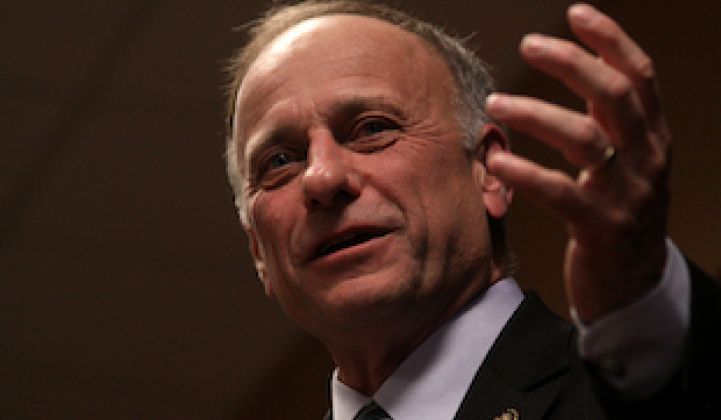It's nearly impossible to get Congress to agree on anything.
But at a clean energy policy forum today, two congressmen -- one Republican and one Democrat -- agreed on three things: renewable energy is necessary, government should help leverage private investment in the sector, and the upcoming congressional showdown over sequestration and the debt ceiling may seriously hurt what's left of federal support.
“We’ve got to be a more reliable partner,” said Iowa Republican Congressman Steve King. "We do all of this [wind, solar, biofuels] and our country becomes more energy secure. […] It’s the right thing to do."
King was speaking to a packed crowd of policymakers, renewable energy companies, and investors on Capitol Hill at the American Council on Renewable Energy's yearly policy forum.
His comments come after a political fight over the production tax credit, which pitted conservative Republicans like Rep. King against their own party during an election year. King was one of a handful of Republicans representing states with high wind penetrations who stood firmly in support of the tax credit. He has also been a major proponent of keeping the renewable fuels standard in place, even as members of his own party seek to repeal that target as well.
His speech touched on the importance of federal clean energy policies -- mostly on biofuels, but also on wind and solar -- that weren't nearly as controversial five years ago as they are today among conservatives in Congress.
"The central theme that I’d like to address here is that we want to attract risk capital. Wise investment money. There has to be a reliable partnership. [...] When you hear people on the other side say, 'Just cut out all the subsides' and 'Free enterprise will sort it all,' you think about all the money for M16s and bulletproof vests we spend [to get energy]. That’s a subsidy."
But when talking to reporters in the hall after his speech, the Congressman didn't have much good to say about Congress' ability to ensure that reliability.
"Congress has a lot of important things to do and we aren’t very good at multi-tasking. We’re sitting here looking at sequestration, the debt ceiling and the national debt. [...] I don’t think it becomes less politicized."
King's Democratic colleague, Rep. Chris Van Hollen of Maryland, agreed wholeheartedly. The intensifying debate in Congress over automatic budget cuts and the country's borrowing limit -- commonly described as a "self-inflicted wound" -- could end up hurting existing federal programs for clean energy.
"We've got some rocky moments ahead, most of them self-inflicted," said Van Hollen in a speech. "The across-the-board cuts at the Department of Energy will hit ARPA-E, hit important efforts for renewable energy at EERE, and also have a negative impact on the 1603 [grant] program."
Those cuts -- part of $1 trillion in automatic spending reductions -- will occur because of the 2011 Budget Control Act Congress passed in order to force an eventual deal on deficit reduction. However, because lawmakers haven't yet agreed on a deficit reduction package, those cuts could happen after a self-imposed deadline of March 27.
Along with cuts to R&D programs and scaling back grants to companies that have already qualified, the "overall hit to the economy" of such a drastic measure will decrease demand for clean energy, said Van Hollen.
"In this era of divided government, it’s going to be hard to deal with these issues. But that doesn’t mean we can’t look longer-term. And I would encourage you all not to give up. If we stop talking about it, we’re never going to get it," said Van Hollen, ending his otherwise gloomy speech on the state of congressional politics.



